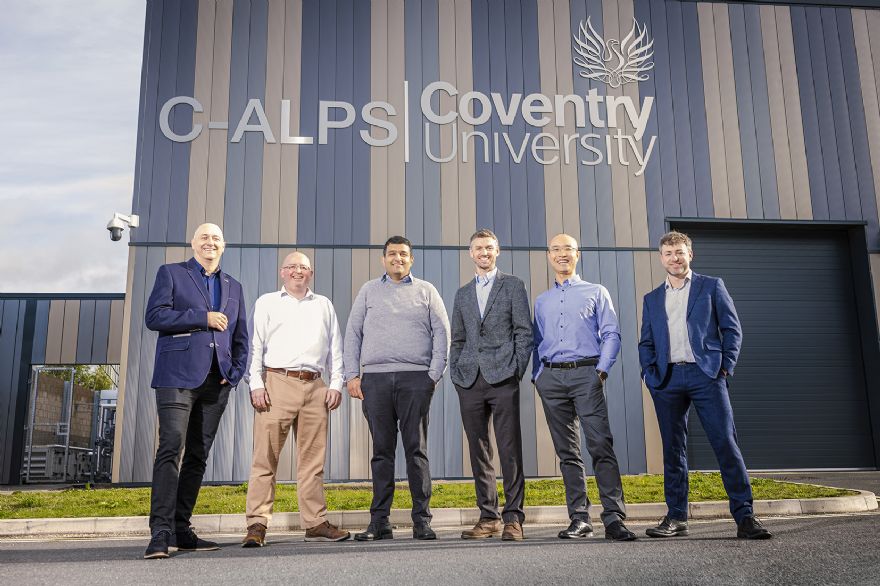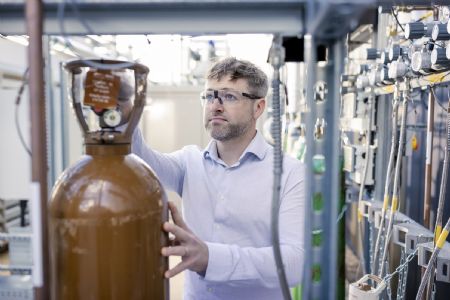 C-ALPS Group 21 (l-r): Professor Petar Igic, Associate Professor Alexander Roberts, Professor Rohit Bhagat, C-ALPS Director Simon Shepherd, Professor Yue Guo and Associate Professor Oliver Curnick
C-ALPS Group 21 (l-r): Professor Petar Igic, Associate Professor Alexander Roberts, Professor Rohit Bhagat, C-ALPS Director Simon Shepherd, Professor Yue Guo and Associate Professor Oliver CurnickCoventry University’s
Centre for Advanced Low-Carbon Propulsion Systems (C-ALPS) has invested over £2 million in creating a dedicated 100m
2 laboratory and hydrogen compound that will allow it to develop hydrogen fuel cell-based powertrains through collaborative research and commercial contracts.
The project also involved the comprehensive upgrade of its powertrain test cells for running with hydrogen fuel systems, and scientists at the £50 million research centre are now setting their sights on generating over £3 million of business every year.
Demand is expected to be fuelled by industrial companies that are keen to harness a capability that can test ‘automotive scale’ fuel cells, with the recent investment giving C-ALPS the opportunity to pipe in up to 300kW of hydrogen power, while test benches have been created to replicate real-world conditions and, more importantly, explore sub-components of larger systems.
Simon Shepherd, Centre for Advanced Low-Carbon Propulsion Systems director, said: “There has been a lot of talk in the media recently about hydrogen power versus battery power and I don’t think it is a constructive debate; if we are going to achieve the UK’s target of being ‘net zero’ by 2050, we are going to need a blend of emerging clean technologies to meet the broad demands of the transport sector.
“Working in a centre with expertise across batteries, hydrogen fuel cells and super-capacitors not only gives us deep insights into the relative attributes and challenges in each technology, it also provides unique opportunities for innovation and crossover between these disciplines.
“Our recent investment has ramped up our capability to take on more hydrogen fuel cell work, both on a commercial contract basis and via collaborative research projects. Both will accelerate the development of fuel cell technology towards viable mainstream adoption for heavy-duty vehicles and applications that require an extended range.”
Proven expertiseHe continued: “The mix of academic and industrial capabilities we have within our team is unique and we now have the system, stack and cell-level testing facilities to exploit these skills to support companies to enhance the performance of their fuel cell powertrains.”
“We have already proven our expertise in this area, with the centre being selected as a key collaborator in the 7 million euro ‘CoacHyfied’ project that will help develop hydrogen-powered mass passenger coaches.”

C-ALPS has been working with the transport sector to create cleaner mobility and develop the supply chain so that it can deliver rapidly developing ‘enabling’ technologies around battery systems, fuel-cell development, power electronics and electric drive systems.
The facility focuses on strong industry and academic collaboration with the aim of creating cutting-edge research, future engineering leaders and powertrain solutions that will drive economic growth and minimise environmental impact.
It offers access to ‘state of the art’ automotive format battery cell prototype manufacture, battery-cell and module testing and characterisation, system modelling, in-situ sensing and advanced diagnostics and expertise in next-generation power electronic devices and sensors.
C-ALPS has already secured over £3 million of major research project wins and is making significant progress in self-sensing/healing battery cells, development of sensing for electric drive systems, advanced on-board diagnostics for battery, fuel cell and hybrid power systems.
Working with FEVGlobal automotive engineering consultancy FEV is currently co-funding several UK and European research projects and PhDs, including research in fuel cell systems. The initial investment of Coventry University in hydrogen facilities will be matched by FEV through plans to upgrade two further test cells to be capable of hydrogen-based powertrain testing at higher power levels.
This will facilitate expansion of activities to commercial vehicle programmes, where the focus will be on both hydrogen-based internal combustion engines (ICE) as well as fuel cells.
Oliver Curnick, associate professor at C-ALPS and technical lead on hydrogen, concluded: “This latest investment in creating one of the largest hydrogen testing capabilities in the UK is a real show of commitment by Coventry University and puts us in an excellent position to gain a strong footing in the world of clean mobility.
“Decarbonising transport — in all of its different forms — is going to take multiple solutions and there is definitely a role for hydrogen to play in supporting the powertrain requirements of larger vehicles, such as coaches, lorries, ships and aircraft.
“It is not a case of one or the other, it is about releasing the potential of all renewable energy sources by developing the means to deliver that energy to the point of use, at the right time, rate and cost.”